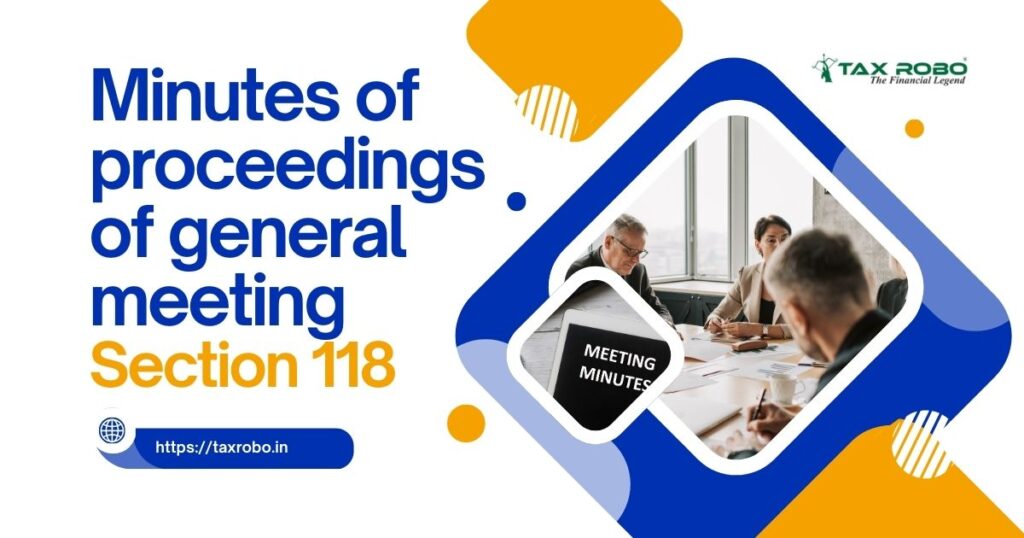Section 118: Minutes of proceedings of general meeting under the companies act 2013
Just held your company’s Annual General Meeting (AGM)? Congratulations on fulfilling a key requirement! But wait, the process isn’t quite complete. What’s the crucial next step for legal compliance and good governance? It’s the proper recording of what happened during the meeting. General meetings, whether Annual General Meetings (AGMs) or Extraordinary General Meetings (EGMs), are pivotal events where shareholders of an Indian company make significant decisions. Section 118 of the Companies Act, 2013, lays down a critical mandate regarding these gatherings: the meticulous preparation and maintenance of minutes of proceedings of general meeting. Understanding and adhering to this section is vital for every registered company in India, regardless of its size. It’s fundamental for maintaining transparency, ensuring legal standing, and following proper Annual general meeting (AGM) under the companies act 2013. This post will guide you through the requirements and importance of meeting minutes.
What are General Meetings under the Companies Act, 2013?
General meetings are the primary forum where the members (shareholders) of a company exercise their collective power to make decisions on matters affecting the company. They are a cornerstone of corporate democracy, allowing owners to oversee the management and direction of their company. The companies act 2013 meeting procedures dictate how these meetings should be called, convened, and conducted, ensuring fairness and proper notice to all members. There are primarily two types of general meetings:
Annual General Meeting (AGM)
- Mandatory Nature: Every company, other than a One Person Company (OPC), is required to hold an AGM each year. There are specific timelines defined in the Act regarding the gap between two AGMs and the period within which the first AGM must be held after incorporation.
- Business Transacted: The typical agenda, often referred to as “ordinary business,” includes:
- Adoption of the company’s annual financial statements, Board’s report, and Auditor’s report.
- Declaration of dividends, if any recommended by the Board.
- Appointment of directors in place of those retiring.
- Appointment of and fixing the remuneration of the statutory auditors.
- Any other item requiring shareholder approval can be included as “special business.”
Extraordinary General Meeting (EGM)
- Purpose: Any general meeting of a company other than an AGM is called an EGM. These are convened to discuss and decide on urgent or specific matters that arise between two AGMs and cannot be postponed.
- Calling an EGM: An EGM can be called by:
- The Board of Directors whenever they deem fit.
- The Board on the requisition of a specified number of members.
- The Requisitionists themselves, if the Board fails to call the meeting within the stipulated time after receiving a valid requisition.
- The National Company Law Tribunal (NCLT) in certain circumstances.
- Business: EGMs exclusively transact “special business,” meaning any item that requires shareholder approval and isn’t part of the ordinary business of an AGM.
For more information on specific procedures and different types of company meetings, see Extraordinary general meeting (EGM) under the companies act 2013.
Section 118 Explored: Requirements for Minutes of Proceedings of General Meeting
Section 118 of the Companies Act, 2013, is unambiguous in its core mandate: every company must cause minutes of the proceedings of every general meeting (AGM or EGM), any meeting of its Board of Directors, and every committee of the Board, to be prepared and signed promptly and kept within designated books. For the purpose of this discussion, we focus on the minutes of proceedings of general meeting. These minutes serve as the official record of decisions taken by the members. Failure to comply attracts penalties, highlighting the seriousness of this requirement under general meeting minutes under companies act India.
Here are the key statutory requirements outlined under Section 118 and associated rules:
Content Essentials
The minutes must provide a clear and accurate picture of what transpired. They must include:
- Basic Information:
- Name of the company.
- Type of meeting (AGM or EGM).
- Day, date, time of commencement, and full address of the venue where the meeting was held.
- Attendance:
- Names of the directors present.
- Names of the members (shareholders) present in person or through authorized representatives (for body corporates).
- Names of members present via proxy (though proxies generally don’t count towards quorum unless the Articles permit).
- Name(s) of the Company Secretary, auditors, or other invitees present, if any.
- Confirmation that the requisite quorum was present throughout the meeting.
- Chairmanship:
- The name of the person chairing the meeting (usually the Chairman of the Board, or another director/member elected as per the Act/Articles).
- Procedural Confirmations:
- Confirmation that proof of dispatch of the notice of the meeting was tabled.
- Confirmation regarding the presence of the necessary quorum.
- Resolutions and Decisions:
- The text of each resolution proposed (clearly identifying whether it’s an Ordinary Resolution or a Special Resolution).
- Details of how each resolution was put to vote (e.g., show of hands, poll demanded/taken).
- A summary of the voting results: the number of votes cast in favour and against each resolution. In case of a poll, specific numbers are crucial.
- Details of any appointments made (e.g., directors, auditors).
- Other Important Details:
- Any specific observations, dissents, or objections raised by members or directors, if the Chairman permits their inclusion. The Chairman has discretion regarding inclusion of matters deemed defamatory, irrelevant, or detrimental to the company’s interests.
- The time the meeting commenced and concluded.
Accuracy and Fairness
A fundamental requirement is that the minutes must contain a fair and correct summary of the proceedings. They should reflect the decisions made accurately and without bias. It’s not a verbatim transcript but a record of what was formally considered and decided.
Timeline for Recording
The clock starts ticking as soon as the meeting ends. The minutes of the proceedings of each general meeting must be prepared and entered into the Minutes Book within 30 days of the conclusion of that meeting. This deadline is strict.
Signing and Dating
To make the minutes authentic and evidential, they must be signed and dated.
- Who Signs: The minutes of a general meeting must be signed and dated by the Chairman of the same meeting within the 30-day period. Alternatively, they can be signed by the Chairman of the next succeeding general meeting.
- Importance: The signature authenticates the record. The date of signing is also important, especially if signed at the next meeting.
The Importance of Meeting Minutes India: Why Compliance Matters
Maintaining proper minutes of proceedings of general meeting might seem like administrative overhead, especially for small businesses, but its significance cannot be overstated. Compliance with Section 118 is crucial for several reasons, forming a key pillar of good corporate governance and legal adherence. The importance of meeting minutes India extends beyond mere record-keeping.
- Legal Compliance: First and foremost, it’s the law. Section 118 mandates the keeping of minutes. Non-compliance constitutes an offence under the Companies Act, 2013. The company and every officer of the company who is in default can face significant monetary penalties. Regulatory bodies like the Registrar of Companies (ROC) can inspect these records, and discrepancies or absence can lead to serious consequences. Adhering to the companies act 2013 meeting procedures for minutes is non-negotiable.
- Evidentiary Value: This is perhaps one of the most critical aspects.
- Prima Facie Evidence: Section 118(8) explicitly states that minutes kept in accordance with the provisions of this section shall be evidence of the proceedings recorded therein. Furthermore, where minutes are duly drawn and signed, the meeting is deemed to have been duly called and held, all proceedings are deemed to have duly taken place, and appointments of directors, key managerial personnel, or auditors are deemed valid until the contrary is proved. This “prima facie” status means the minutes are accepted as correct on the face of it in legal or regulatory proceedings, shifting the burden of proof to anyone challenging their accuracy.
- Dispute Resolution: Inevitably, disputes can arise – between shareholders, between management and shareholders, or even with third parties regarding decisions made. Properly maintained minutes serve as the official, unbiased record of what was decided, by whom, and how. They can be invaluable in resolving conflicts, clarifying misunderstandings, and providing a factual basis for legal arguments. Without accurate minutes, proving what actually happened in a meeting becomes incredibly difficult.
- Corporate Governance: Transparency and accountability are hallmarks of good corporate governance. Maintaining detailed and accurate minutes demonstrates a company’s commitment to these principles. It ensures that there is a clear record of how decisions impacting the company and its stakeholders were made, providing assurance to shareholders, lenders, and regulators that proper processes are being followed. This builds trust and enhances the company’s reputation.
- Historical Record and Continuity: Business decisions build upon each other. Minutes provide a chronological, formal history of the company’s significant decisions, policy changes, and governance actions taken at the shareholder level. This historical record is essential for:
- Future Reference: New directors, management, or even auditors can refer back to past minutes to understand the context and rationale behind previous decisions.
- Audits: Statutory auditors often review minutes as part of their audit procedures to verify approvals for financial statements, dividend declarations, related party transactions, and appointments.
- Tracking Progress: Minutes help track the implementation of resolutions and monitor the company’s progress against strategic decisions approved by shareholders.
Practical Guidelines for General Meeting Minutes India
Ensuring your general meeting minutes under companies act India are compliant and effective requires attention to detail and adherence to best practices. Here are some practical guidelines for general meeting minutes India:
Best Practices for Recording
- Objectivity: Focus on recording what was decided, including the exact wording of resolutions and the outcome of votes. Avoid recording verbatim discussions or subjective interpretations unless a specific dissent needs to be noted as requested and permitted. The minutes should be factual and neutral.
- Clarity and Conciseness: Use clear, simple, and unambiguous language. Avoid jargon where possible or explain it if necessary. Sentences should be concise and to the point. The goal is easy understanding for anyone reading the minutes later.
- Accuracy: Double-check all critical details: names of attendees, directors, the Chairman; dates and times; the exact wording of resolutions; and the voting figures (especially for polls). Accuracy is paramount for the minutes’ evidentiary value.
- Structure: Organize the minutes logically. Use numbered paragraphs for distinct items, especially resolutions. A consistent structure makes minutes easier to read and reference. Follow the chronological order of the meeting proceedings.
Common Mistakes to Avoid
- Delay: Failing to prepare and get the minutes signed within the mandatory 30-day period.
- Omissions: Leaving out essential information required by the Act, such as the list of attendees, confirmation of quorum, exact resolution wording, or voting details.
- Verbatim Recording: Trying to capture every word spoken. Minutes should summarize decisions, not transcribe conversations.
- Subjectivity: Including personal opinions or biased commentary.
- Improper Signing/Dating: Forgetting to have the minutes signed by the correct Chairman or failing to date the signature.
- Incorrect Maintenance: Not keeping minutes in a proper Minutes Book (bound or securely maintained electronically) or failing to ensure pages are consecutively numbered.
Maintaining the Minutes Book
- Format: Minutes must be maintained in books kept specifically for that purpose. These books can be either:
- Physical: Securely bound books with pages consecutively numbered. Loose-leaf binders are generally not permitted unless specific precautions are taken. Minutes should not be pasted or attached; they should be written or printed directly onto the numbered pages.
- Electronic: Minutes can be maintained electronically, provided they are kept securely with time stamping, are not alterable once entered, and can be presented in a legible format. Adequate backups and security measures are essential.
- Location: The Minutes Books for general meetings must be kept at the registered office of the company.
- Inspection Rights: Under Section 119 of the Companies Act, 2013, the Minutes Book of general meetings must be kept open during business hours for inspection by any member without charge, subject to reasonable restrictions as the company may impose (but allowing at least two hours each business day for inspection). Members are also entitled to request copies of the minutes upon payment of prescribed fees.
Role of Company Secretary (CS)
In larger companies, a qualified Company Secretary is typically responsible for ensuring compliance with all secretarial matters, including the preparation and maintenance of minutes. They possess the expertise to ensure minutes meet all legal requirements. However, in many small private limited companies that are not required to appoint a full-time CS, this responsibility often falls upon one of the directors or another authorized person designated by the Board. It is crucial that whoever takes on this role understands the requirements of Section 118 thoroughly.
For specific interpretations or complex situations, referring to the official text of the Companies Act, 2013, on the Ministry of Corporate Affairs website or consulting with a legal/secretarial professional is advisable.
Conclusion
To wrap up, Section 118 of the Companies Act, 2013, isn’t just a procedural formality; it’s a cornerstone of corporate accountability and legal compliance in India. The mandate to meticulously prepare, sign, and maintain minutes of proceedings of general meeting ensures a reliable record of shareholder decisions, protects the company legally, and fosters transparency. From detailing attendees and resolutions to capturing voting outcomes accurately and meeting the 30-day deadline, the requirements are specific and must be followed diligently.
For small businesses and growing enterprises, overlooking the proper handling of minutes of proceedings of general meeting can lead to penalties, disputes, and governance issues. It is non-negotiable for maintaining legal health, operational clarity, and building stakeholder trust. Don’t let administrative tasks compromise your company’s standing.
If you find navigating company law compliance challenging or need assistance ensuring your meeting minutes and other secretarial records are in perfect order, TaxRobo is here to help. Our experts can provide guidance and handle these crucial tasks efficiently.
Need expert help with company compliance and secretarial matters? Contact TaxRobo today for reliable guidance. TaxRobo Online CA Consultation Service.
Frequently Asked Questions (FAQs) about Meeting Minutes
Question 1: Who is primarily responsible for preparing the minutes of proceedings of general meeting in a small private limited company without a Company Secretary?
(Answer: In the absence of a designated Company Secretary, the responsibility typically falls upon one of the directors, as appointed by the Board of Directors, or another officer specifically authorized by the Board for this purpose. The Board remains ultimately responsible for ensuring compliance.)
Question 2: Can general meeting minutes under companies act India be maintained electronically?
(Answer: Yes, the Companies Act, 2013, and the rules made thereunder permit the maintenance of minutes in electronic form. However, they must be maintained with date and time stamping, in a format that cannot be altered once recorded, and ensuring proper security, integrity, accessibility, and retrieval.)
Question 3: What are the penalties for not complying with Section 118 regarding meeting minutes?
(Answer: If a company defaults in complying with Section 118, the company shall be liable to a penalty of twenty-five thousand rupees. Additionally, every officer of the company who is in default shall be liable to a penalty of five thousand rupees. It’s crucial to consult the latest version of the Companies Act, 2013 or Rules, or seek professional advice for the most current penalty amounts and implications.)
Question 4: How long do companies need to preserve the minutes of general meetings?
(Answer: Minutes Books of general meetings (and Board/Committee meetings) must be preserved permanently. They form a part of the company’s statutory records and must be kept in the safe custody of the company, usually at its registered office.)



